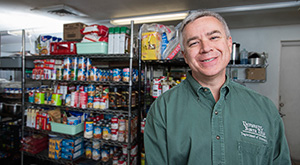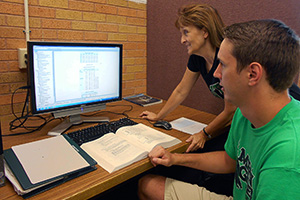November 21, 2014

Michael McPherson (Photo by Ahna Hubnick)
For some University of North Texas economics students, their latest research project is not just a way to develop business-world skills and gain experience to put on their resumes. It's a project that will help feed the hungry.
UNT economics students and faculty members are using their expertise to help Denton soup kitchen Our Daily Bread design a statistical model that can better forecast how many lunches the community soup kitchen will need to prepare each weekday. The model will take into consideration historical data and varying factors such as weather conditions, unemployment numbers and more. UNT students working on the research volunteered to help during a noon mealtime at Our Daily Bread, where they learned how the operation works.
"I was surprised by the number of people that come through there that are hungry. My eyes were really opened," says student Keith Henderson, who is working toward a master's degree in economics research at UNT. "We have people in the community who are in need, and we have the time and resources to help."
Lending a hand

Justin Martin, a UNT student, and Margie Tieslau, associate professor of economics,
are on a team of people collaborating with Our Daily Bread to design a statistical
model that can better forecast how many meals the community soup kitchen will need
to prepare each day.
Michael McPherson, professor of economics, and Margie Tieslau, associate professor of economics, received a community engagement grant from UNT to pursue the project, which began in the spring semester.
"If you are preparing that much food for that many people with donated money, you have to be really careful," McPherson says. "You want to get as much bang for your buck as you can. If you prepare too many meals, you waste food. If you don't prepare enough, you don't feed people. So our goal is to have a simple program in the end that the folks at Our Daily Bread can use every morning."
Since the project began in the spring, four graduate students in economics have worked on it. Henderson joined the project in the fall.
"This is a good skill to have," says Henderson, who is combing through the data on the project. "Being able to find out statistically why something is true will translate into a lot of fields."
Calculating needs
The forecasting model is expected to be finished by the end of the fall semester, and it may be ready for implementation in early 2015.
When completed, the forecasting system will consider the last 14 years of historical data from the organization, as well as the day-to-day factors that may affect how many people visit.
"Some people might be very good at projecting how many meals will be needed based on their gut feeling, but I hope that the statistical model that we build will provide a reliable and more accurate projection based on various predictable external factors," Tieslau says.
Filling a need
When Our Daily Bread opened in 2000, the organization served about 12 to 15 people a day, says Millie Bell, executive director of Our Daily Bread. After about a year, about 75 to 100 people a day came by for meals. And now, Our Daily Bread professional chef Liz Whitaker prepares an average of 205 meals a day.
"But it does fluctuate," Bell says. "If we have an accurate forecast based on historical data, and they can come up with an accurate forecast that takes into account unemployment, recession and population growth, then we can prepare more accurate meals. It's going to be great, and I'm really looking forward to it."
Growing experience
Beyond getting hands-on experience on an economics research project, students learn how their work and education can help others, McPherson said.
"We teach them how to do this, but usually we don't see the human face behind it," McPherson says. "Here's a chance. They can go back to the computer and build this model, knowing they're helping these people, and that's a rare opportunity for a graduate student."
Even after the forecasting system is built, Tieslau expects to use the project as an example in her forecasting class each spring semester.
"As much as possible, I try to expose these students to hands-on applied projects that teach them practical real-world skills," she says. "And it also might bring additional awareness to Our Daily Bread and, hopefully, inspire some of them to consider volunteering at Our Daily Bread or for some other community project. In addition, as often happens when bright minds brainstorm about a given topic, the students might come up with new and useful ideas about how to use this data to better serve Our Daily Bread."